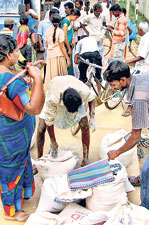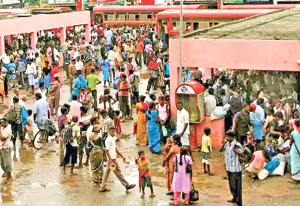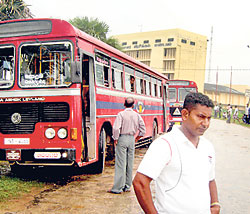With the government allowing freedom of movement to internally displaced people in camps, food items distributed among refugees are being openly sold in the streets of Vavuniya.
Scores, if not hundreds, of IDPs visit Vavuniya town daily to sell dry rations given to them in the camps and earn money. Thousands of villagers are also flocking to the town to buy rice, flour, sugar and dhal from the IDPs at prices cheaper than the market prices, with the area outside the Vavuniya hospital becoming a makeshift trading centre. The town looks a highly congested area in the mornings.
 |
| IDPs selling flour and other dry provisions in Vavuniya town. Pix Priyantha Hewage |
Here rice is sold at between Rs. 40 and 50 a kilo, flour at Rs 40 a kilo, sprats at Rs. 125, dhal at Rs. 50 and vegetable oil at Rs. 125 a litre.
Asked why they sold the dry rations given to them, an IDP from Vavuniya’s Arunachalam camp said he sold part of the dry rations he got to buy vegetables for his family.
A government servant said he could buy food items at this makeshift market at prices cheaper than the main market. “Thanks to these IDP traders, we can manage the cost of living,” he said.
An IDP gets 1.4 kilo of flour and 1.4 kilo of rice in addition to 100 grams of dhal and 100 grams of sugar every week.
To curb this practice of selling food items, authorities have imposed a rule that an IDP can only take a maximum of ten kilos of items out of the camp. To circumvent the restrictions, the IDPs pack the items in bags of ten kilos and get the assistance of those who do not carry any goods to get the food items out of the camp.
However, in the Menik Farm, the situation is different. There, traders from outside come to buy dry rations from the IDPs and sell them at the market at a higher price. They buy a kilo of dhal at Rs. 35 and rice and flour at Rs. 20 a kilo.NGO officials working in IDP camps said some of the IDPs starved or would not use up their dry rations because they wanted to sell them in the market and earn some money to buy other essential items. As a result, malnutrition and illness could become a major problem in the camps in time to come, they said.
All roads lead to town
By Priyantha Hewage
The once tardy town of Vavuniya is bustling with new life, seven months after the end of the 26-year-old separatist war.
Hundreds of new shops have come up while thousands of hawkers compete with each other to attract the large number of people who walk past them along not-so-wide streets.
 |
| Vavuniya town bustling with new life |
The opening of the A9 Road and the permission granted to internally displaced people to freely move in and out of camps have made Vavuniya town one of the busiest places in the Northern Province.
The hive of activity has buried the eerie calm and the gloom that once pervaded the town.
Vavuniya’s Urban Council Chairman S.N.G. Nathan said the population in the town had shot up to about 200,000 due to IDP-related activities and the increased traffic along the A 9 highway.
“The IDPs get free transport from the camps to the town and some 35 buses have been deployed for their services. At least 5,000 IDPs come to the town daily,” he said.
Mr. Nathan said relatives and friends from other areas also visited the town to meet the IDPs while armed forces personnel also came there to buy their needs, making the town look overcrowded.The UC chairman said small shops were mushrooming and more hawkers were coming to the town to cater for the needs of the visitors.
According to him, there are already 1.500 shops in the town.
Vavuniya’s Traffic Police Chief Wasantha Pushpakumara said he deployed almost all his officers to the town to control the increased traffic. He said thousands of school children also visited the town and he had made a request to authorities to install traffic lights at the town’s busy junctions.
Passport applicants on the rise
There has been a steady increase in the number of people applying for passports since the end of the war, according to the Immigration Department’s regional office in Anuradhapura.
For this year so far, the regional office issued more than 20,000 passports, regional head H.M.P. Bandara said.
“This number is about 5,000 more than the number of passports issued last year,” he said.
The regional office issues passports to residents of the north and east including those from the war-ravaged areas of Vavuniya, Mullaitivu, Mannar and Kilinochchi.
Traffic picks up on A9
Buddhist pilgrims flock to the north
By N. Parameswaran
With the opening of the A9 Road, the number of Buddhist pilgrims arriving in Jaffna on their way to Nagadeepa has increased.
City officials say they hope more people from the south will visit the northern capital now that most of the restrictions on travel have been eased.
 |
| Colombo-bound buses lined up in Jaffna. Pic by Priyantha Hewage |
These officials say that at least 15 buses carrying Buddhist pilgrims come to Jaffna daily and they are seen mingling freely with the people of the north.
Passenger traffic to the northern cities and towns has increased after bus services were resumed from Colombo, Kandy and other main cities to Jaffna, Vavuniya and Mannar after a lapse of 19 years.
The A9 Road was kept open during the ceasefire period from 2001 to 2004 but no passenger bus services operated on this vital highway then.
Now even private buses operate on the A 9 Road and their business is booming. Every half an hour, a bus leaves Jaffna for Vavuniya while private mini buses at the Jaffna bus stand take off to Vavuniya as soon as the seats are full.
In addition to buses, private vans have also returned, offering transport services between Colombo and Jaffna. During the ceasefire period, 12-seat vans were the main mode of public transport between the south and Jaffna along the A 9. About 200 such vans operated then, picking up passengers from their door step and dropping them at wherever the passengers wanted in Jaffna.
Luxury bus services also operate between Colombo and Jaffna. |



